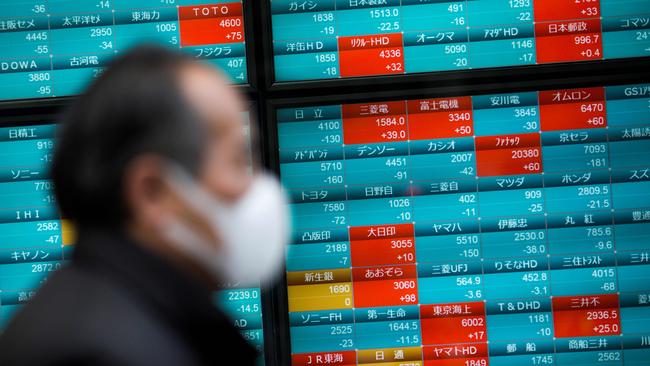Time to be choosy with low returns looming: Lazard
Investors should brace for single-digit returns for the next five to 10 years, according to Lazard Asset Management’s Ron Temple.

Investors should brace for single-digit returns across multiple asset classes for the next five to 10 years, according to Lazard Asset Management head of US equity Ron Temple, who also warned markets were being too complacent in looking through the risks posed by the COVID-19 coronavirus.
In a wide-ranging interview with The Australian, Mr Temple also outlined why he thought rates would stay lower for longer and how stock selection would increasingly determine investment outcomes in the coming years.
“Regardless of which asset you choose to own, expect lower returns. Bonds, public equities, private equity, real estate, I think all of those returns were inflated by monetary policy. Over the next five to 10 years, expect lower returns. Materially lower,” Mr Temple said.
“It could be mid to high single digits, but in an environment like that, the security selection will be much more important than it was when you had equity markets giving as much as 18 per cent per annum in the US over the past 11 years.”
US sharemarkets have scaled record highs after a decade of gains spurred by loose monetary policy. The US S&P 500 returned 28 per cent in 2019, the best return since 2013, while the Nasdaq gained 35 per cent and the Dow Jones surged 22 per cent. The local ASX 200, which is also bouncing around record highs, jumped 21 per cent over 2019.
“All you needed to do (in the past decade) was own equities, it didn’t really matter which ones. Looking forward, if you’re in a market that gives you 5 to 7 per cent returns, the choice of securities will be a lot more important to your total return than it was in the past 10 years.”
While there were initial concerns about the impact of the coronavirus on markets in January, they have staged a quick rebound as investors stepped in on the dip. Mr Temple believes the optimism may be premature.
“Investors seem to be very optimistic (about the coronavirus) in terms of just assuming that it’s something you can compare to SARS, and also, assuming that if it is worse than SARS, that central banks can manage it.
“In 2003, when SARS was an issue, China was about 4 per cent of global GDP. Now it’s 17 per cent. So I think that comparison is ill-founded. And when I look at the infection rate and the fatality rate, the trajectory on both counts is actually quite worrying, in terms of what we see now versus SARS,” he said.
Rather than suggesting markets should be alarmed, Mr Temple believes more attention needs to be paid to what the virus could do to productivity. “(On) daily power, coal consumption is down 53 per cent from the pre-Lunar New Year levels. Typically at this point, relative to Lunar New Year, that’d be 10 to 20 per cent lower, not 50 per cent. And the Baidu migration index indicates that only 34 per cent of the people who left tier one cities for Lunar New Year have returned, versus 97 per cent last year.
“That says to me there’s a very significant portion of the Chinese economy still being negatively affected. And given its representation within the global GDP, I think there’s a real economic impact (to the virus),” he said.
Investors were also wrong to assume central banks can deal with the economic fallout from the virus, he warned: “Central banks can lower interest rates, but that doesn’t mean people can go back to work with a coronavirus.
“I just think the market is being a little too complacent in terms of looking through this.”
As investors navigate the uncertain waters ahead, Mr Temple predicted stock selection would increasingly have an impact on investor returns.
“In 2020, and beyond, the call is really going to be much more about which securities you choose to own, because the returns from the market are going to be substantially lower than they have been in recent years. And instead, you’re going to be seeking more of your return from the security selection rather than just the asset allocation.”
There were some “seriously overvalued” companies within the technology sector in the US, but there was also good value to be found, he said.
“It’s such a big sector you can clearly find a range of things. I will say, that at least for the strategies that I oversee (at Lazard), we are less overweight. We’re either in line relative to the benchmark on technology or even underweight slightly in a number of cases, compared to the last decade, when we were substantially overweight.
“We are finding it harder to find good value in tech, and there’s even companies where we see an opportunity but we’re probably less enthusiastic than we have been (in the past) given how much the valuations have gone up.”
Commenting on the outlook for interest rates, Mr Temple said the US Federal Reserve made a mistake in 2018 by hiking four times. “I think they’ve learned that lesson. And I think they’re going to be loath to make that mistake again, of fighting a problem (inflation) that does not exist. And so my expectation is that they will keep rates on hold. And if anything, the risk is that they might lower rates again, if coronavirus, for example, became a much bigger issue.
“ I think hiking rates is not on the agenda at this point,” he said.




To join the conversation, please log in. Don't have an account? Register
Join the conversation, you are commenting as Logout